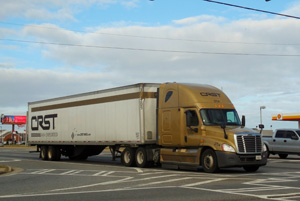Senior Reporter
CRST Petitions for HOS Exemption Allowing Drivers to Use Split Sleeper Berth Time

The Cedar Rapids, Iowa-based carrier asked the Federal Motor Carrier Safety Administration to allow its team drivers to take the equivalent of 10 consecutive hours off duty by splitting sleeper berth time into two periods totaling 10 hours, provided neither of the two periods is less than three hours.
Current HOS rules require that all sleeper berth rest regimens include, in part, the use of a sleeper berth for at least eight hours — combined with a separate period of at least two hours, either in the sleeper berth, off-duty or some combination of both — to gain the equivalent of at least 10 consecutive hours off-duty.
CRST said it operates one of the industry's largest fleets of team drivers with 4,000 drivers and 1,931 vehicles. According to CRST, the average driver team typically travels approximately 3,500 miles per week and that 75% of its drivers obtain at least 34 consecutive hours off-duty while on the road each week.
That carrier said that drivers have told CRST that driving an entire 10- or 11-hour shift is too long and that they want the opportunity to switch with a partner more frequently. According to CRST, having the flexibility to switch with a partner allows each driver to take advantage of shorter time periods when they may feel fatigued.
Further, splitting the sleeper berth time for both team drivers would allow each driver to obtain sleep during critical nighttime hours, which would provide more restorative sleep, the carrier said.
CRST believes that by allowing its team drivers to exercise flexibility in their SB requirements, the drivers would experience more quality rest.
CRST International is No. 25 on this year’s Transport Topics Top 100 list of the largest for-hire carriers in the United States and Canada.
Earlier this year, FMCSA granted a similar one-year sleeper berth hours-of-service exemption to McKee Foods Transportation. The exemption allows the carrier’s team drivers engaged in delivery and backhaul operations to take the equivalent of 10 consecutive hours off-duty by splitting sleeper berth time into two periods.


